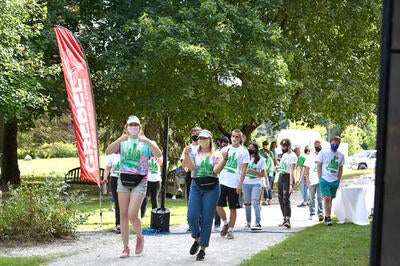 The 2020 school year has sparked necessary academic innovation and imaginative problem-solving. With the new challenges posed by COVID-19, students, professors, and staff at Grebel have found new ways to learn, connect, and grow. Faculty and staff spent spring term ensuring the safety of students and staff in the building, planning the best virtual courses possible, and equipping everyone with resources for a successful term.
The 2020 school year has sparked necessary academic innovation and imaginative problem-solving. With the new challenges posed by COVID-19, students, professors, and staff at Grebel have found new ways to learn, connect, and grow. Faculty and staff spent spring term ensuring the safety of students and staff in the building, planning the best virtual courses possible, and equipping everyone with resources for a successful term.
Course enrollment increased from last year. Graduate course enrollment is up 25% and undergraduate courses also have very strong enrollment. The Master of Theological Studies program welcomed 16 new students. Emmanuel Israel, in his last year of his MTS degree, mentioned that his professors adjusted classes by shortening lectures and focusing class time on discussions, a core element in the program, to “help avoid Zoom and screen burn-out.”
Some Things Never Change
After a summer without students in the residence and only a partly filled apartment building, the joy of welcoming students back to live at Grebel brought its usual energy. The investment of time and energy put into re-imaging community life, COVID-style, was well worth it. We asked some students, both on-campus and off-campus, to share what it is like living at or connecting with Grebel this term.
The Music Department in particular is pushing traditional boundaries, as they offer seven online ensembles, emphasizing collaboration, team-work, and instrumental and vocal technique. Fourth-year music student Sarah Lauren Brown is taking this need for connection even further. With the help of two friends, she created an online server for the Music Society so “we still have the same sort of access to peers as we typically would at Grebel.”
Although smaller because of the pandemic, community remains a large part of the Grebel experience. With only single rooms available this fall, there is a combined total of 102 students in the residence and apartments, and a similar number is expected in the winter term. “From making tables with dividers so we can eat together, to making unused classrooms into games rooms, study rooms, and a place to watch movies all at a physical distance,” explained second-year student Nathan Toews, “Grebel has done a fantastic job keeping community at the centre.”

Many non-residents are connecting with Grebelites for online games, virtual talent shows, and more. First-year virtual resident Selah Woelk said, “I have really enjoyed making online connections in the past couple of months. Sometimes it can feel like I am missing out, but people are coming up with inventive ways to keep us all connected.” Throughout the term, Grebel is hosting a multitude of virtual and in-person events like door decorating, virtual chapel, volleyball, and the Friday Wave, a temporary Community Supper replacement. There are 112 non-residents who can come to campus to join the socially distanced fun outside or log on virtually.
“Students have been very responsive to the health and safety protocols,” added Mary Brubaker-Zehr, Director of Student Services. “We want students to continue to build relationships and to be accountable to one another. These responsible actions, along with the COVID-19 screening pilot project we were involved in, have allowed us to continue to co-create community—COVID style.”
Life at Grebel and the University of Waterloo looks a little different than in previous years, but with some of the creativity and innovation UWaterloo is known for, students and professors are finding ways to stay healthy, stay connected, and have a fun-filled term.










